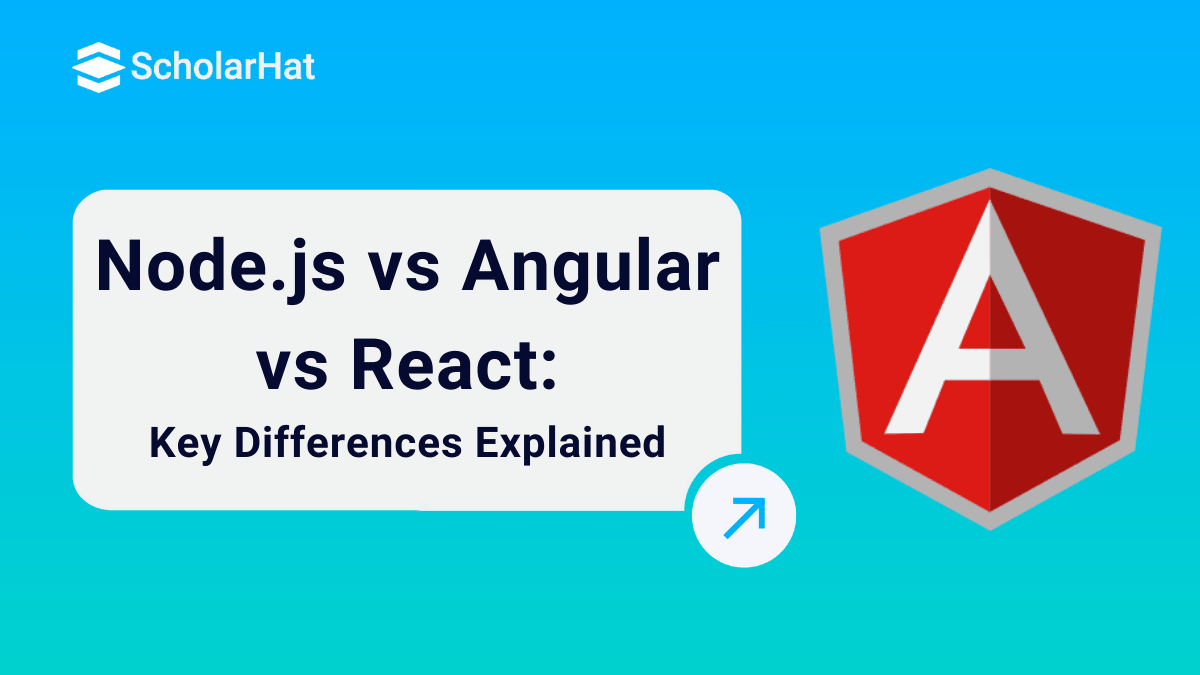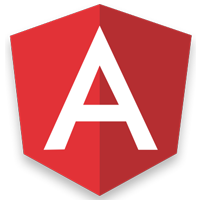26
DecThe Difference Between Node.js Vs. Angular Vs. React
Node.js Vs. Angular Vs. React
Which is better to use, Node.js vs. Angular vs. React? Every developer encounters these questions when developing applications. These days, some of the most popular web development technologies include Node.js, Angular, and React. Each has a distinct role, but because of their overlapping features, it might be challenging to select the best tool for a job. Angular and React deal with front-end programming, whereas Node.js concentrates on server-side JavaScript.
This Angular tutorial will guide you in learning about Node.js, Angular, and React, including when you should use Node. js, when should you use Angular, when should you use React, Comparison Table: Node.js vs. Angular vs. React, advantages and disadvantages, and many more
What is the Node.js?
Node.js is a runtime environment based on the JavaScript V8 engine seen in Chrome. It enables programmers to build server-side programs using JavaScript. By allowing developers to use the same language for both the front-end and back-end, Node.js has completely changed back-end development.

Why do We Use Node.js?
- Scalability: Because of Node.js's event-driven architecture, applications can readily grow to accommodate additional users and data without consuming a lot more resources.
- Rich Ecosystem: The Node Package Manager (npm) makes a large collection of libraries and frameworks for Node.js available, which may increase functionality and speed up development.
- Active Community: Node.js has a sizable and vibrant community that provides continuous support, tools, and resources, which facilitates knowledge sharing and assistance finding for developers.
Advantages of Node.js
- Simple to scale: Node.js's event-driven architecture makes it easy to expand apps as they get bigger.
- Excellent for real-time apps: It's perfect for apps like chat apps, online games, or teamwork tools that need real-time data.
- Fast development: JavaScript across the full stack makes development faster and reduces context switching.
- Active community: Strong community support ensures a wide variety of tools, libraries, and frameworks for enhancing productivity.
Disadvantages of Node.js
- Unsuitable for intensive processing: Node.js's single-thread operation might cause it to lag while doing CPU-intensive operations like image processing or machine learning.
- Nested Callbacks: Working with asynchronous code may lead to intricate, layered callbacks, which are sometimes referred to as "callback hell." Async/await and promises may be used to handle this.
- Inconsistent code practices: In big Node.js projects, it can be challenging to maintain a consistent coding style due to JavaScript's flexibility.
What is the Angular?
Angular is a front-end web application framework developed by Google. It is a comprehensive solution for building dynamic web applications and focuses on single-page applications (SPAs). Angular provides a complete toolset for client-side development, including two-way data binding, dependency injection, and built-in modules for forms, HTTP requests, and routing.

Why do We Use Angular?
- Great for huge projects: Because of its structure and architecture, Angular is perfect for large, complicated apps since it makes managing them easier.
- Simple data syncing: Two-way data binding makes data administration easier by instantaneously updating the data with changes made to the user interface and vice versa.
- Modular components: Angular makes use of reusable, modular components that facilitate the effective development and administration of huge applications.
Advantages of Angular
- Good TypeScript Support: Angular's use of TypeScript allows for improved code organization, simpler debugging, and early error detection, all of which improve code quality.
- Two-Way Data Binding: Angular effortlessly synchronizes data between the display and the model, simplifying real-time data management and updating.
- Great tooling: The Angular CLI provides strong tools for effectively developing, testing, and launching apps.
- Strong ecosystem: Angular is backed by Google, meaning long-term support and frequent updates.
Disadvantages of Angular
- Regular Updates: Because Angular is changed often, developers must keep up with the most recent versions, which may cause compatibility problems.
- Complex Setup: For smaller or simpler projects, the additional setup and structure needed to set up an Angular project may be too much to handle.
- Verbose syntax: The framework's syntax is often more complex and requires writing a lot of boilerplate code compared to React or other libraries.
What is the React?
React is a JavaScript library developed by Facebook for building user interfaces, especially single-page applications. It focuses on the view layer, making it ideal for rendering dynamic content efficiently with its virtual DOM.

Why do We Use React?
- Reusable parts: You may save time and effort by building your app's minor parts (components) once and using them in other locations.
- Faster performance: Apps operate more effectively thanks to React, which only refreshes the portions of the webpage that change.
- Easier maintenance: It helps to organize and manage complex apps by breaking them into smaller, manageable pieces.
- Supportive community: With a large community and plenty of tools, solving problems and finding help is easier.
Advantages of React
- Fast rendering: React is quicker for dynamic user interfaces since the virtual DOM only updates the portions of the page that require modification.
- Easy to learn: React offers a lower learning curve than Angular, especially for developers who are already comfortable with JavaScript.
- Reusable components: React's components make code maintainability easier by being readily reusable across the application.
- Strong community: One of the most popular front-end technologies, React, has a great community and a lot of third-party libraries.
Disadvantages of React
- Not a complete framework: React is only a library that concentrates on creating user interfaces, in contrast to Angular, which is a whole framework. This implies that for tasks like routing and state management, you'll need to utilize other libraries.
- JSX Syntax: React utilizes a combination of JavaScript and HTML. Newcomers who aren't accustomed to combining these two languages may find this perplexing.
- Updates frequently: React is always changing, with new features and modifications being added on a regular basis. Because of this, keeping current and adjusting to the most recent changes may be difficult.
The Difference Between Node.js Vs. Angular Vs. React
| Feature | Node.js | Angular | React |
| Type | Runtime environment (Back-end) | Framework (Front-end) | Library (Front-end) |
| Language | JavaScript | TypeScript/JavaScript | JavaScript/JSX |
| Architecture | Event-driven, non-blocking I/O | Component-based MVC | Component-based |
| Use Case | Real-time apps, API development | Enterprise-grade SPAs | Dynamic UIs, SPAs |
| Learning Curve | Moderate | Steep | Easy to Moderate |
| Performance | High for I/O; weak for CPU-bound | Good, but slower than React | Excellent due to virtual DOM |
| Development Speed | Fast | Slower due to verbose structure | Fast |
| Scalability | Highly scalable | Scalable for large apps | Scalable for dynamic UIs |
| Community Support | Strong | Strong (backed by Google) | Strong (backed by Meta) |
| Type Checking | Optional (JS) | Mandatory (TypeScript) | Optional (JS) |
| State Management | External libraries needed | Built-in | Requires external libraries |
| Real-time Applications | Excellent | Limited | Limited |
| Tooling | NPM, many third-party tools | Angular CLI | Create React App, external tools |
Conclusion
In comparing Node.js vs. Angular vs. React, each serves distinct purposes. Node.js excels in backend development with real-time capabilities, Angular is best for large-scale, structured front-end applications, while React offers flexibility for building dynamic user interfaces. The choice between Node.js vs. Angular vs. React depends on project needs and team expertise. Become a front-end development expert with our Angular Certification course. Sign up today on ScholarHat and start creating dynamic, responsive web apps.
FAQs
- Node.js performs well for I/O tasks but may struggle with CPU-intensive tasks.
- Angular can experience performance issues in very large applications if not optimized.
- React generally offers high performance through its virtual DOM, especially for dynamic interfaces.
Take our Angular skill challenge to evaluate yourself!

In less than 5 minutes, with our skill challenge, you can identify your knowledge gaps and strengths in a given skill.







